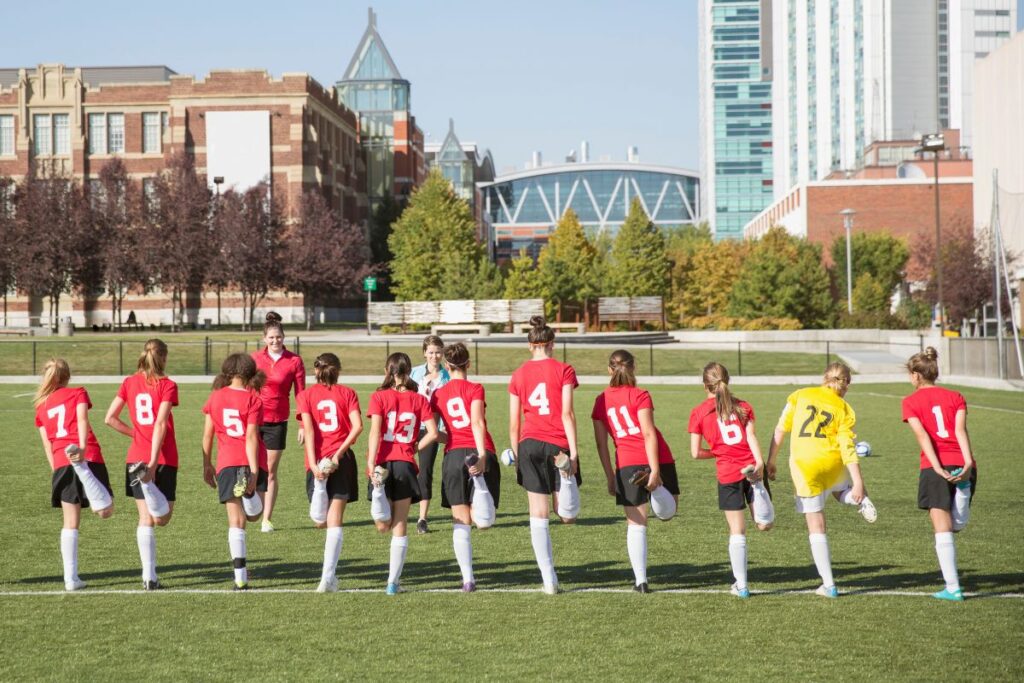The Emotional & Physical Tolls
of Women's College Soccer
Kickoff
Women’s college soccer is an exciting journey that combines the thrill of sports with the pursuit of higher education.
Student-athletes on these teams are undoubtedly some of the most dedicated and hardworking individuals.
However, beneath the excitement lies a web of challenges that can have significant emotional and physical ramifications.
In this article, we will delve into the immense pressure these athletes face and the toll it takes on their overall well-being. We will also explore how parents can support their daughters in this demanding endeavor.
The Juggling Act: Balancing Academics and Athletics
Student-athletes in college soccer often find themselves in a constant balancing act. They must excel in the classroom while dedicating countless hours to rigorous training and competing in matches. This relentless schedule can lead to sleep deprivation, increased stress levels, and sometimes even academic struggles.
Moreover, parents play a crucial role in helping their daughters manage this juggling act. They can provide emotional support, assist with time management, and encourage their daughters to seek academic resources when needed. It’s essential for parents to understand the unique challenges their daughters face and offer guidance accordingly.
Injury Prone: The Physical Toll
The demands of competitive college soccer can be physically punishing. The risk of injuries, especially knee and ankle injuries, is significantly higher among soccer players. The pressure to perform at peak levels in every game can lead to overexertion, contributing to these injuries. We will explore the long-term consequences of these physical strains and discuss injury prevention strategies.
The Emotional Rollercoaster
The emotional aspect of being a student-athlete in college soccer is often underestimated. The pressure to win, the expectations from coaches and teammates, and the fear of failure can lead to anxiety and depression. We will discuss the mental health challenges faced by these young athletes and the importance of providing emotional support, both from parents and the university.
The Social Sacrifice
While their peers are enjoying a typical college experience, soccer players are often bound by strict schedules that limit their social lives. This isolation can lead to feelings of loneliness and frustration. We will touch upon the sacrifices these athletes make to pursue their passion for the sport and how parents can help their daughters maintain a healthy social life.
Coping Mechanisms: Strategies for Success
Despite the challenges, many student-athletes find ways to thrive in the world of competitive college soccer. We will explore the coping mechanisms they use to manage their academic responsibilities, physical health, and emotional well-being. Parents can support their daughters by encouraging these strategies and being a source of motivation.
The Importance of Support Systems
Support from coaches, teammates, and university staff is vital for the success and well-being of college soccer players. We will discuss the role of these support systems in helping athletes navigate the pressures of their demanding schedules. Additionally, parents can actively engage with their daughters’ coaches and academic advisors to ensure a holistic support network.
How Parents Can Support Their Daughters
Parents can play a pivotal role in their daughters’ college soccer journey. They can:
Provide emotional support: Being a listening ear and offering encouragement during tough times can make a significant difference.
Encourage time management: Help your daughter create a balanced schedule that allows for both academics and soccer.
Attend games and matches: Show your support by being present at games and cheering for your daughter’s team.
Advocate for academic resources: If academic challenges arise, parents can work with the university to ensure their daughters have access to tutoring and academic assistance.
Promote self-care: Encourage your daughter to prioritize rest, nutrition, and mental well-being.
FAQs
How common are injuries in college soccer? Injuries are relatively common in college soccer, with a higher risk of certain types, like knee and ankle injuries, due to the sport’s nature.
Do all college soccer players face emotional challenges? While not all, many college soccer players experience emotional challenges due to the pressure to perform and excel in both academics and athletics.
What can universities do to support student-athletes better? Universities can provide academic assistance, mental health resources, and flexible scheduling to support the unique needs of student-athletes.
Are there success stories of college soccer players who have overcome these challenges? Yes, there are numerous success stories of student-athletes who have excelled both in soccer and academics while managing the pressures effectively.
How can parents help their daughters balance academics and soccer effectively? Parents can assist by encouraging time management, providing emotional support, and advocating for academic resources when needed.

Author: Teesta Sisodia Sullivan
Teesta Sisodia Sullivan founded Soccer Talented to champion equality in women's soccer. Through her other initiative, Go Soccer Pro, Teesta has facilitated numerous footballers in realizing their European dreams.
Possessing an eclectic academic portfolio — a Law Degree from Stetson University, a Master's in Health Science from the University of North Florida, and a BA in Psychology from the University of Miami — she pairs in-depth knowledge with practical engagement.
She's a dedicated soccer mom to three children, although now all grown. Teesta recognizes the ambitions of budding players and is committed to fostering a conducive environment for their growth.
Conclusion
In the world of women’s college soccer, the pressure to perform at a high level can take a toll on both the physical and emotional well-being of student-athletes.
It is essential to recognize these challenges and work towards creating an environment that fosters not only athletic excellence but also overall well-being.
With the right support, both from parents and the university, these talented young women can navigate these challenges and emerge stronger.

Share Your Experiences
If you are a parent or player with experiences related to this article, please share them with us so we can share them with others.
Questions or Comments About the Article that we can help?


